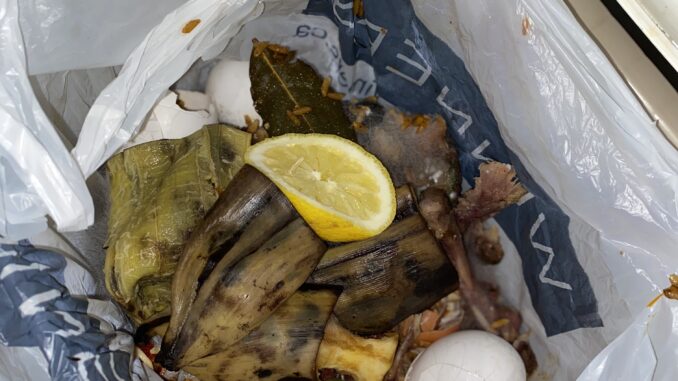
Azeezat and Dami Podcast
Food Waste: The Impact On The Environment
Food waste as the name implies is simply edible food that is appropriate for human consumption not eaten- and disposed of. According to Greenpeace Canada, ‘’recent research suggests the amount of edible food thrown away by the average household represents enough calories to have an adult over for dinner five nights a week without adding a dime to the grocery bill.’’
Food waste is a massive problem globally. Not only because there are countries in parts of the world where there is a shortage of food, but also because food waste has adverse effects on the environment.
The Food and Agriculture Organisation of the United Nations says over 1.3 Million trillion tonnes of food is wasted globally annually. That runs to over 2.6 trillion USD annually. This is actual food that has been processed that can feed almost a billion hungry people in the world four times over.

Photo Credit: Azeezat Ishola
In Canada, almost 2.2 million tonnes of edible food is wasted annually. The cost to Canadians is an excess of 17 billion Dollars according to The City of Toronto. Wasted food not only wastes all that time and resources used to grow, produce and distribute the food as we said earlier it contributes significantly to climate change.
According to a report entitled ‘The Avoidable Crisis of Food Waste’ carried out by Second Harvest, a Toronto Agency that collects surplus food and distributes it to places like shelters, Food waste in Canada creates some 56.6 million tonnes of carbon dioxide-equivalent emissions. Food in landfills also creates methane gas, which is "25 times more damaging to the environment than carbon dioxide. The annual cost of avoidable food loss and waste in Canada is $1,766 per household.
To help with the processing of unavoidable food waste, the Toronto Government introduced the Green Bin program to aid with the disposal of food scraps, peels, cores etc.

Photo Credit: Azeezat Ishola
- Approximately 100,000 tonnes of food waste is generated annually in Toronto
- The average single-family household disposes of over 200kg of food waste per annum.
- Of the 200kg of food waste, fruits and vegetables take up almost 42% of food wasted.
In Toronto, over 50 per cent of food wasted by a single-family household is avoidable if only people would only buy what they need and would eat. Proper food storage is another key reason a lot of food is wasted.
According to Shane Moffat, the Head of Nature and Food Campaign at Greenpeace Canada, one effective way of putting an end to food waste is to be really intentional with your food and use every last bit of it. ‘’There's some great recipes and guides out there which help you, I guess, use all those different ingredients you find at the bottom of your fridge at the end of the week. ‘’
Other Ways To Curb Food Waste
- Freezing extra food: Putting food in the freezer not only keeps in good condition for longer, it also keeps it fresh. Although various foods have different freezer life span.
- Shop Smart: Buying only what you need for your meals not only limits the tendency of having to throw out food, it also helps you save money-and save the planet.
- Buy frozen fruits & vegetables: Frozen fruits and vegetables keep well, reduce the stress of chopping and preparing food from scratch. It’s a better deal for you and the environment.
- Follow a meal plan or quantity plan: There are many meal plan companies that allow you to pick your portion size for your weekly meals. If you can’t afford to subscribe to those, it is worth it to create one of your own and stick to it.
- Feedback App: This is an app that partners with restaurants to sell their food to customers during off-peak periods at a discounted price. This is a win-win situation for everybody as the amount of food wasted in these restaurants is greatly reduced and customers are saving money as well.
- Eat out when you can (or order takeout): Who doesn’t like to have dinner out with friends once in a while? Just ensure you order what you can eat in one sitting. Due to the pandemic, ordering takeout when possible is also a good option.
- Use up food before it spoils. You can use it to bake, make smoothies, cook up new recipes etc.: And on days when you realize you have food going bad in the fridge, whip up a smoothie, bake a new recipe, and treat yourself to something made from the leftovers.
- And never go grocery shopping hungry!
Story by: Azeezat Ishola and Damilola Onime

Be the first to comment